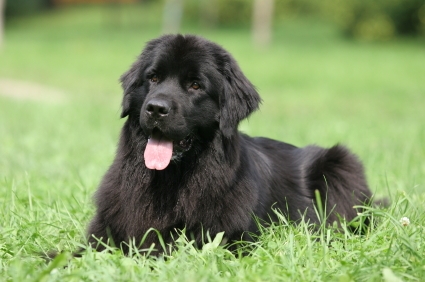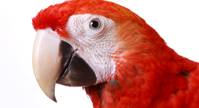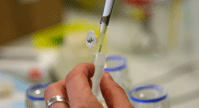Canine Cystinuria
Description:

Not every dog that has the mutation responsible for Cystinuria will exhibit symptoms. Stones causing inflammation and blockage are often more common in males, due to their long, narrow urethra. Females exhibit symptoms much less frequently and may be completely asymptomatic.
Canine Cystinuria affects over 60 breeds of dogs. Research suggests that Newfoundlands carry a more severe form of this disease than other breeds. In a variety of breeds affected by Canine Cystinuria, symptoms are often not experienced until about 4-5 years in age. However, Newfoundlands may begin experiencing problems as early as 6 months to one year of age. Newfoundlands are much more likely to experience recurring urethral blockages that could require surgical intervention.
In the Newfoundland breed, the cause of Cystinuria is a single nucleotide polymorphism that occurs in the SLC3A1 gene which causes a premature stop codon. Cystinuria is a recessive disorder, meaning that the dog must have two copies of the defective gene to suffer from the disease. Because Cystinuria is a recessive disorder, a dog can also be a carrier of this disease, meaning it carries one copy of the mutation but does not display any symptoms. If two carriers are bred together, there is a 25% chance per puppy born that it will develop symptoms of Cystinuria.
Sample Type:
Animal Genetics accepts Buccal Swab, Blood, Dewclaw. Collection kits are available and can be ordered at test now.
Test Is Relevant to the Following Breeds:
Landseer, Newfoundland
Results:
Animal Genetics offers DNA testing for Canine Cystinuria. The genetic test verifies the presence of the recessive CY gene and presents results as one of the following:
| CY/CY | Affected | The dog carries two copies of the mutant gene and is homozygous for Cystinuria. The dog is affected by Canine Cystinuria. |
| CY/n | Carrier | Both the normal and mutant copies of the gene detected. The dog is a carrier for Canine Cystinuria. |
| n/n | Clear | Dog tested negative for the Cystinuria gene mutation, and will not pass on the defective gene to its offspring. |
Submit a Sample for Testing:
To submit a sample for testing please go to test now.
To
order a sample collection kit please go to order sample collection kits.
Cost per sample is $45.00. Please see our Canine Fee Schedule for all test rates.










